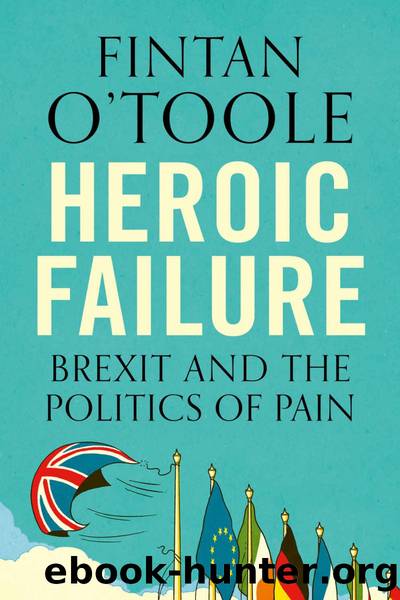Heroic Failure: Brexit and the Politics of Pain by Fintan O'Toole

Author:Fintan O'Toole [O'Toole, Fintan]
Language: eng
Format: epub
Tags: United Kingdom, Non-Fiction, Politics, 21st Century, Europe, Brexit
ISBN: 9781789540987
Google: a99DuwEACAAJ
Amazon: 1789540984
Goodreads: 42288847
Publisher: Apollo
Published: 2018-01-22T00:00:00+00:00
5.
SADOPOPULISM
âI hurt myself today
to see if I still feelâ
â TRENT REZNOR, âHurtâ
If you are English and in your fifties or early sixties, two things are likely to be true of you. One is that in 2016 you voted to leave the European Union: 60 per cent of both men and women in the UK aged between fifty and sixty-four did so. The other is that you were, in the immediate period after the UK joined the Common Market, a punk. Or if not an actual punk, then a vicarious one, living off the thrills of the most powerful and original English cultural movement of modern times. These two truths are closely related. At the level of high politics, Brexit may be defined by upper-class twittery. It seems more P.â¯G. Wodehouse than Johnny Rotten. But at the level of popular culture, it is pure punk. John Lydon (formerly Rotten), having initially opposed Brexit, later identified himself with it: âWell, here it goes, the working class have spoke and Iâm one of them and Iâm with them.â1
In a sense, this is the wrong way round â they are with him, or at least with the Johnny Rotten of the mid-1970s. Had it not had the genius of Take Back Control, a perfect slogan for the Leave campaign would have been Never Mind the Bollocks, Hereâs Brexit! For it is in punk that we find, not just the nihilistic energy that helped to drive the Brexit impulse but, more to the point, the popularization of masochism. What heroic failure and fantasies of Nazi invasion did for the middle and upper classes, punk did for the young and the working class. Many Brexit voters were formed by its most breathtaking, counter-intuitive stylistic gesture â the idea of masochism as revolt, of bondage as freedom. Punk took bondage gear out of the bedroom and onto the street; Brexit took coterie self-pity out of the media-political boudoir and into real politics.
Objectively, the great mystery of Brexit is the bond it created between working-class revolt on the one side and upper-class self-indulgence on the other. There would seem to be an unbridgeable gulf of style and manner â let alone of actual economic interests â between the stockbroker superciliousness of Nigel Farage or the self-parodic snootiness of Jacob Rees-Mogg on the one side and the raw two-fingered defiance of working-class patriotism on the other. Brexit depended on an ostensibly improbable alliance between Sunderland and Gloucestershire, between hard old steel towns and rolling Cotswold hills, between people with tattooed arms and golf club buffers.
One great binding agent was âAnarchy in the UKâ, the sheer joy of being able to fuck everything up. Boris Johnson, who used The Clashâs âLondon Callingâ as the theme song for his successful campaign to be mayor of London, also chose the same bandâs version of âPressure Dropâ on Desert Island Discs in October 2005. On that programme, in a rare moment of self-reflection, Johnson spoke of the pleasure of making trouble that motivated
Download
This site does not store any files on its server. We only index and link to content provided by other sites. Please contact the content providers to delete copyright contents if any and email us, we'll remove relevant links or contents immediately.
| Arms Control | Diplomacy |
| Security | Trades & Tariffs |
| Treaties | African |
| Asian | Australian & Oceanian |
| Canadian | Caribbean & Latin American |
| European | Middle Eastern |
| Russian & Former Soviet Union |
The Secret History by Donna Tartt(16611)
The Social Justice Warrior Handbook by Lisa De Pasquale(11486)
Thirteen Reasons Why by Jay Asher(7783)
This Is How You Lose Her by Junot Diaz(5754)
Weapons of Math Destruction by Cathy O'Neil(5032)
Zero to One by Peter Thiel(4818)
The Myth of the Strong Leader by Archie Brown(4786)
Promise Me, Dad by Joe Biden(4441)
Stone's Rules by Roger Stone(4413)
Beartown by Fredrik Backman(4406)
How Democracies Die by Steven Levitsky & Daniel Ziblatt(4393)
The Fire Next Time by James Baldwin(4338)
100 Deadly Skills by Clint Emerson(4072)
A Higher Loyalty: Truth, Lies, and Leadership by James Comey(4027)
Rise and Kill First by Ronen Bergman(4009)
The David Icke Guide to the Global Conspiracy (and how to end it) by David Icke(3876)
The Farm by Tom Rob Smith(3870)
Secrecy World by Jake Bernstein(3774)
The Doomsday Machine by Daniel Ellsberg(3726)
